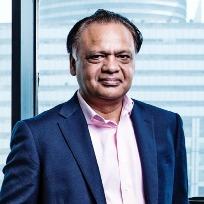Sudhir Mathur
Reflecting on your time at PwC India, what makes you feel most proud?
At that time, the field of management consulting was in its embryonic stages, and my experience was marked by a diversity of assignments, ranging from market surveys to accounting systems and project reports across various industries. My four-year tenure at PwC India provided me with a crucial skill - conceptual clarity, whether I was engaged in proposal writing or drafting reports. The skills and holistic perspective gained during my time at the firm have proven invaluable, consistently strengthening my ability to think critically and strategically.
Wearing the PwC badge is a source of great pride for me, and I have consistently chosen PwC as a partner in all the companies I have worked with, including a venture that I co-founded with another PwC alum.
Were there any moments during your time in the firm that left an indelible mark on you?
During my time at PwC, two elements stand out. First, I met my wife, Geeta at PwC making the organisation hold an extraordinary place in my heart for both of us. This personal connection adds a unique and sentimental layer to my professional journey, tying my personal and career milestones to the PwC experience.
Secondly, Bharti, my immediate supervisor, significantly influenced my professional growth. She invested in me not only in terms of functional skills but also in shaping my values and enhancing my thinking.
Two celebratory moments at PwC stand out in my memory. The elevation of Deepak Kapoor to Partner marked a significant milestone. Similarly, the moment when Ashwani Puri became a consulting partner was another celebratory highlight.



Describe your leadership style
Adapting my leadership approach across diverse organisations has been about adaptability, risk management, and effective collaboration. I firmly believe that leadership is not defined by a singular style but is a dynamic quality which requires the ability to navigate new situations. Itit starts with defining the problem at hand, assembling the right team to address the specific challenge and taking calibrated and debated risks.
Acknowledging that I am not a technical expert in any specific field, I have shaped my career by learning from interactions with colleagues and partners / stakeholders across the spectrum. This collaborative approach allowed me to tap into a wealth of knowledge and diverse perspectives, contributing to more comprehensive decision-making.
What are some of the trends or movements you’re seeing in the health industry that could be a game changer?
Family-centric healthcare:
- MeraDoc's primary objective is to establish a mass-market Outpatient Department (OPD) that revolves around a Family General Physician. This model, inspired by successful global Medicare practices, places the General Physician at the centre and extends the concept to include the entire family as part of the care plan. This family-centric approach is designed to address the disproportionately high incidence of chronic issues in India, including diabetes, blood pressure, and cholesterol as most cases relate to genetic transmission.
- By going beyond traditional healthcare, we can improve not only the longevity of an individual but also their quality of life. By incorporating wellness features into our offerings, we can focus on preventive measures and holistic well-being.
Offline integration and care plan sales:
- Recognising the eventual phasing out of discounts on e-commerce platforms in pharmacy and diagnostics by working on a dual strategy. This includes integrating offline chemists and diagnostic labs while utilising these physical locations as natural footfall places to sell care plans to create a hyper-local model of healthcare. Besides the Family GP medicine delivery and diagnostics, it can offer specialist hospitalisation, insurance, and much more.
How can the Indian health sector transform the health economy which can potentially close the health equity gap?
Creating equity will come about only through a low-cost family general physician, digitisation of health records of the family that are available to doctors (with consent of course), generic medicines combined with virtual availability of the doctor and referral to specialist and hospitals only where necessary. We believe AI will be a game-changer in the healthcare sector and will contribute to both prevention and cure of medical issues because the transformative potential of AI and what it envisions can be leveraged to integrate multiple wearable general and medical devices. This includes continuous well-being monitoring and the transmission of specific health data online to enable doctors to provide immediate and remote care.
What advice would you give young people on taking career risks?
Go for it - Embrace diversity:
- Diversity of experience, especially in the first five years, is immensely valuable for future growth. Don't be afraid to explore different roles and industries. With a strong recruitment threshold and training at PwC, you have the intellectual capability to excel in any field. Trust in your abilities and know that expertise will develop over time. Put yourself forward for challenges that others may shy away from. Taking calculated risks to deliver results will set you apart.
- Keep close to the tangible aspects of the business world, beyond just spreadsheets and the virtual realm. Understand how things are manufactured, the supply chain, and the intricacies of operations will contribute to a more holistic professional experience.
- Given the sensitivity of the work, the firm does recognise the distinction between ethics and values. Ethics involve choices between right and wrong, while values involve choices between two rights. Being ethical is expected from professionals but values define you as a person. Understanding and upholding both are crucial in maintaining a successful career.
- Uphold high standards of work quality. Strive to exceed expectations and consistently deliver results that reflect your commitment to excellence.















